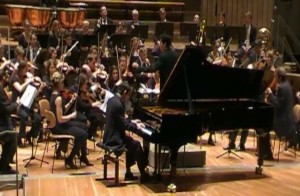After I learned the second movement of the Schubert Sonata in A Major, D664, my new piano teacher, Mark Pakman, explained I would now shift my practice of the Andante into “performance mode.” Play the piece all the way through, despite any glitches, as though performing for a crowd of people, he instructed. “But you make mental notes of any parts that need work,” Mark said. Then practice the offending passages and begin the cycle again.
“That’s so cool,” I thought to myself.
When I arrived home, I realized why I felt so elated. Playing the Schubert Andante without stopping, as though sailing down my front walk, oblivious to a stray piece of trash caught in the grass, was the way I used to practice, in the days when I had reclaimed the piano shortly after my 40th birthday. My only objective was to savor the music. Once I made a commitment to learning music more quickly and to performing, I had to issue myself stern reminders to work through weak passages.
Now Mark had given me permission to relax my disciplined piano practice with the Andante from the Schubert Sonata in A Major. Or at least that was how I chose to interpret his guidance. When I sat down at the bench, I felt as though I had taken a seat in a Viennese cafe and ordered a chocolate ganache à la Schubert. “Performance mode,” I thought to myself with glee.
I plowed into the Andante. Several measures in, I played the resolution of an appoggiatura with a heavy clang, although the note was supposed to peal more softly than its dissonant cousin. I stopped. Hold on a minute, I was supposed to be in performance mode. I continued. I congratulated myself for handling the section with tricky left hand arpeggios. Then I stumbled on two sets of triplets dancing up the keyboard, and I stopped again. “No, no,” I told myself gently, “you are supposed to be in performance mode.”
Performance-mode practice turned out not to be as easy as savoring a bite of chocolate ganache. I needed a good two weeks of concentrated effort before I could consistently execute a solid hour of practice in that way. The trick, I realized, was to separate, even cleave, in my mind the acknowledgment of mistakes, a botched chord or missed fingering, from the act of addressing them.
Next on GRAND PIANO PASSION™, a review of Gerald Shea’s new memoir about music and hearing, Song without Words.
 look inside |
Sonata in A Major, Op. 120, D. 664 By Franz Schubert (1797-1828). Edited by Maurice Hinson. For solo piano. Masterworks; Piano Solo; Solo. Alfred’s Masterwork Library. Form: Sonata. Classical Period. Early Advanced; Late Intermediate. Single piece. Standard notation, fingerings and introductory text (does not include words to the songs). Op. 120, D. 664. 24 pages. Published by Alfred Music Publishing (AP.27624)…more info |




Separating the mistakes from the act of addressing them is going to be my mantra as I raise three teenagers! Thank you!